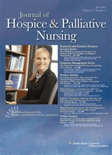
Journal of Hospice & Palliative Nursing
Scope & Guideline
Elevating Standards in Hospice Nursing.
Introduction
Aims and Scopes
- Palliative Care Education and Training:
The journal emphasizes the importance of education and training for nurses in palliative care, including the development of curricula that incorporate evidence-based practices and competencies necessary for effective patient care. - Patient and Family-Centered Care:
Research often highlights the significance of understanding and addressing the needs of patients and their families during the end-of-life journey, focusing on communication strategies and support systems. - Interprofessional Collaboration:
The journal promotes studies that explore collaborative approaches among healthcare professionals to improve palliative care delivery, emphasizing the roles of nurses in interdisciplinary teams. - Ethical and Cultural Considerations:
Ethical dilemmas and cultural factors in end-of-life care are frequently examined, providing insights into the complexities of decision-making in diverse patient populations. - Innovative Practices and Interventions:
The journal features research on innovative practices and interventions in hospice and palliative care, including the use of technology, community-based programs, and holistic approaches to care.
Trending and Emerging
- Telehealth and Remote Care:
The COVID-19 pandemic has accelerated the adoption of telehealth in palliative care, leading to increased research on the effectiveness and implementation of remote care strategies. - Cultural Competency and Health Equity:
There is a growing focus on cultural competency and health equity in palliative care, with studies highlighting the need to address disparities in care and improve access for marginalized populations. - Mental Health and Emotional Support:
Research is increasingly addressing the mental health needs of both patients and caregivers, emphasizing the importance of emotional support and resilience in coping with serious illness. - Educational Interventions for Nursing Students:
Emerging studies are exploring the impact of educational interventions aimed at enhancing nursing students' competencies in palliative care, preparing them for future practice. - Community-Based Palliative Care Models:
There is a trend towards exploring community-based palliative care models that engage families and local resources, reflecting a shift in care delivery from institutional to home settings.
Declining or Waning
- Traditional End-of-Life Care Models:
There is a noticeable reduction in publications centered around traditional models of end-of-life care, as the field moves towards more integrated and holistic approaches that cater to patient individuality. - Solely Pharmacological Interventions:
Research focusing exclusively on pharmacological interventions for symptom management is waning, with a growing emphasis on non-pharmacological strategies and comprehensive care approaches. - Generalized Palliative Care Studies:
The journal has seen fewer publications that broadly discuss palliative care without specific focus. There is a trend towards more targeted studies that address specific populations or conditions.
Similar Journals
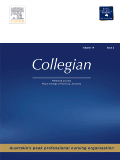
Collegian
Shaping the Future of Nursing Education and Practice.Collegian is a distinguished academic journal published by Elsevier, focusing on the dynamic field of nursing. Launched in 1994 and continuing through to 2024, it aims to contribute to the advancement of nursing knowledge and practice. With an ISSN of 1322-7696 and an E-ISSN of 1876-7575, this journal has achieved an impressive standing, securing a Q2 category ranking within Nursing (miscellaneous) and positioning itself at #49/139 in the general nursing category on Scopus, with a commendable 65th percentile. The journal provides a platform for both established researchers and emerging scholars to share innovative research, case studies, and reviews that shape nursing education and practice. Although not open access, it remains widely recognized for its rigorous peer-review process and substantial contributions to nursing literature. As the profession evolves, Collegian stands out as a pivotal resource for professionals, educators, and students who seek to enhance their understanding and application of nursing science.
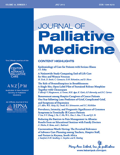
JOURNAL OF PALLIATIVE MEDICINE
Championing scholarly excellence in the art of compassionate care.Welcome to the Journal of Palliative Medicine, a distinguished peer-reviewed publication dedicated to advancing the field of palliative care. Published by Mary Ann Liebert, Inc., this journal serves as a vital resource for researchers, healthcare professionals, and students in the disciplines of anesthesiology, nursing, and general medicine. With an impressive track record since its inception in 1998, the journal has achieved Q1 status in both Anesthesiology and Pain Medicine, as well as in Nursing (Miscellaneous), reflecting its scholarly impact within the academic community. The impact factor and rank underscore its significance, with the journal positioned at the 75th percentile in General Nursing and the 65th percentile in Anesthesiology and Pain Medicine according to Scopus rankings. Though the journal follows a subscription model, it remains committed to disseminating critical research that improves patient care and quality of life for those facing serious illnesses. As the field continues to evolve, the Journal of Palliative Medicine remains a cornerstone for fostering innovation and education in palliative practices, underscoring the importance of compassionate care.
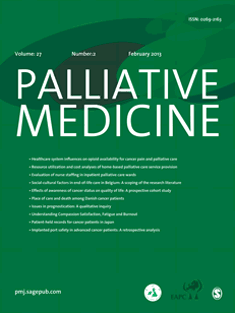
PALLIATIVE MEDICINE
Exploring New Horizons in Pain ManagementPalliative Medicine is a premier journal dedicated to advancing the field of palliative care, published by SAGE Publications Ltd. Established in 1987 and continuing through 2024, this esteemed journal focuses on the integration of pain management and comprehensive care for patients with life-limiting illnesses. With its impressive impact factor and a prestigious Q1 ranking in both Anesthesiology and Pain Medicine, as well as in Medicine (miscellaneous), it stands as a critical resource for researchers, healthcare professionals, and students engaged in this vital area of medicine. The journal emphasizes original research, reviews, and clinical studies that contribute to the understanding and practice of palliative care, promoting improved quality of life and support for patients and their families. Although not open access, articles are accessible through institutional subscriptions, ensuring the dissemination of knowledge to a wide audience. Whether you are a seasoned researcher or an emerging professional in the field, Palliative Medicine remains an invaluable platform for scholarly exchange and innovation.
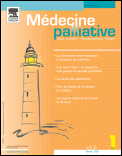
Medecine Palliative
Fostering Compassionate Care Through Evidence-Based Insights.Medecine Palliative is a distinguished journal published by Elsevier, dedicated to the vital field of palliative care and pain management. With an ISSN of 1636-6522 and E-ISSN 2213-0098, this international journal has been an essential resource since its inception in 1970, currently covering research from 2004 to 2024. The journal reflects a commitment to enhancing the quality of life for patients facing serious illnesses, addressing critical issues in Anesthesiology and Oncology, while fostering innovative nursing practices in palliative care. While the journal holds a Q3 ranking in Anesthesiology and Pain Medicine and a Q4 in Oncology categories, making it a valuable venue for researchers and practitioners aiming to contribute to the evolving landscape of palliative medicine. Despite its lower rank in some categories, the journal serves as an important platform for insights, clinical findings, and current practices that can significantly impact patient care. Medecine Palliative is accessible to researchers, professionals, and students who are eager to explore the latest advancements and evidence-based approaches in end-of-life care.
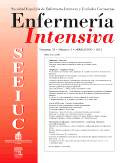
Enfermeria Intensiva
Elevating Patient Care with Specialized Nursing ResearchEnfermeria Intensiva, published by Elsevier Science Inc, is a highly regarded journal in the fields of Advanced and Specialized Nursing as well as Critical Care and Intensive Care Medicine. With an impressive track record spanning from 1994 to 2024, this journal serves as a vital resource for researchers, healthcare professionals, and students dedicated to enhancing the quality of patient care in critical settings. It holds a coveted Q2 ranking in multiple nursing categories as of 2023, reflecting its influence and contribution to the ongoing discourse in nursing practices. Although currently not an open access journal, it continues to provide intricate insights into both fundamental skills and specialized techniques essential in intensive nursing care. By bridging research and practical application, Enfermeria Intensiva plays a pivotal role in advancing knowledge and improving outcomes in critical care environments.

Australian Journal of Advanced Nursing
Fostering Excellence in Advanced Nursing EducationThe Australian Journal of Advanced Nursing, published by the Australian Nursing Federation, has established itself as a vital resource in the fields of nursing and advanced nursing practice since its inception in 1983. With an ISSN of 0813-0531 and an E-ISSN of 1447-4328, this peer-reviewed journal aims to disseminate high-quality research, innovative practices, and critical reviews that contribute to the advancement of nursing knowledge and education. With a commendable impact factor and currently positioned in the Q2 quartile in both Advanced and Specialized Nursing and miscellaneous Nursing categories as of 2023, the journal is ranked among the top publications in the field, reflecting its significance and influence in shaping nursing practices and policies in Australia and beyond. The journal provides open access options for a wider readership while specializing in progressive topics that address contemporary challenges in nursing, thus serving researchers, practitioners, and educators alike. It continues to be a cornerstone for advancing the professional development of nursing disciplines, supporting a community that thrives on evidence-based practice and interdisciplinary collaboration.
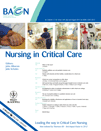
Nursing in Critical Care
Championing the evolution of nursing practices in high-stakes environments.Nursing in Critical Care is a premier journal dedicated to the advancement of knowledge and practice in the field of critical care nursing. Published by WILEY, this esteemed journal has established itself as a leader in the domain, holding a prestigious Q1 ranking in Critical Care Nursing as of 2023, and ranking as the 2nd out of 27 in its category according to Scopus, with an impressive 94th percentile. Since its inception in 1996, it has been an essential platform for disseminating cutting-edge research, evidence-based practices, and critical insights that directly impact patient outcomes in high-stakes environments. While not an Open Access journal, it offers accessible options for institutions and individuals dedicated to the continuous evolution of nursing practices in critical care settings. The journal promises to remain at the forefront of the discipline, providing invaluable resources for researchers, practitioners, and students alike who aspire to enhance their expertise and improve the standards of care within intensive health scenarios.
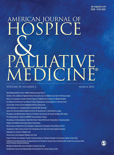
American Journal of Hospice & Palliative Medicine
Nurturing knowledge to support patients and families in critical moments.The American Journal of Hospice & Palliative Medicine, published by SAGE Publications Inc, is a leading peer-reviewed journal dedicated to advancing the field of hospice and palliative medicine. With its ISSN 1049-9091 and E-ISSN 1938-2715, the journal has been a vital resource since its inception in 1984, aiming to provide comprehensive insights into clinical practices, innovations, and research findings that enrich the quality of life for patients with serious illnesses. It holds a prestigious position as a Q2 journal in the field of medicine (miscellaneous), ranked #139 out of 636 in General Medicine with an impressive 78th percentile standing according to Scopus. The journal does not currently operate under an Open Access model, ensuring rigorous review and quality control of its content. Researchers, clinicians, and students are encouraged to engage with the latest developments and evidence-based practices in palliative care as the journal continues to shape discussions and policies in this critical area of healthcare.
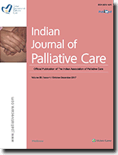
Indian Journal of Palliative Care
Shaping the future of care with impactful research and insights.Indian Journal of Palliative Care is a premier peer-reviewed publication dedicated to advancing the field of palliative care within the broader domains of health policy and public health. Published by SCIENTIFIC SCHOLAR LLC in India since 2003, this Open Access journal is committed to providing a platform for innovative research and practices that promote quality of life for patients with life-limiting illnesses. With a focus on health policy and environmental and occupational health, the journal holds a respected position in the Q3 quartile for both categories, reflecting its significant contributions to scholarly discourse. Ranked #393 in Public Health and #185 in Health Policy according to Scopus, it serves as an essential resource for researchers, professionals, and students seeking to deepen their understanding of palliative care and its implications within public policy and health frameworks. Through its rigorous editorial standards and broad accessibility, the Indian Journal of Palliative Care plays a vital role in shaping effective solutions and policies that aim to enhance patient care and well-being.
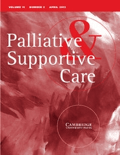
Palliative & Supportive Care
Elevating Quality of Life Through ResearchPalliative & Supportive Care, published by Cambridge University Press, is a pivotal journal dedicated to advancing research and practice in the fields of palliative care, supportive care, and the psychological aspects of terminal and chronic illness. With a robust ISSN of 1478-9515 and an E-ISSN of 1478-9523, this esteemed journal has established itself as a vital resource for professionals, researchers, and students who are committed to improving the quality of life for patients facing serious health challenges. Featuring peer-reviewed articles that span clinical psychology, medicine, nursing, and psychiatry, it holds a respectable impact factor, ranking Q2 in Clinical Psychology, Medicine, and Nursing as per the 2023 category quartiles. The journal is based in the United Kingdom and has been contributing to the field since its inception in 2003. Although it currently does not offer Open Access, its rigorously curated content underscores its relevance and importance in facilitating interdisciplinary dialogue and innovation in palliative and supportive care. For those seeking to stay at the forefront of research, Palliative & Supportive Care remains an indispensable platform for scholarly communication and discovery.